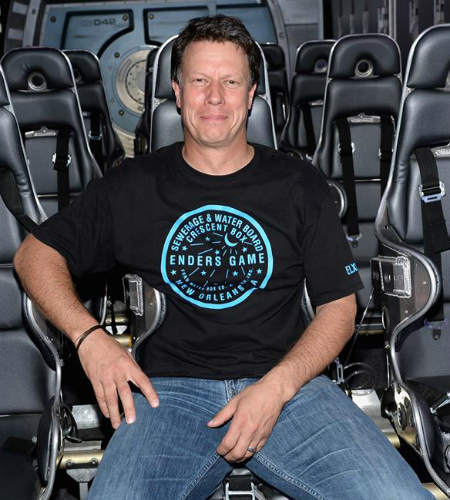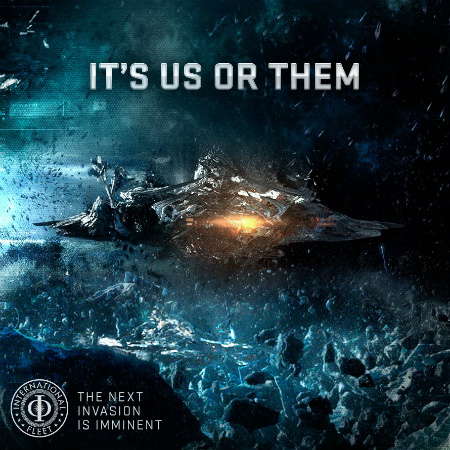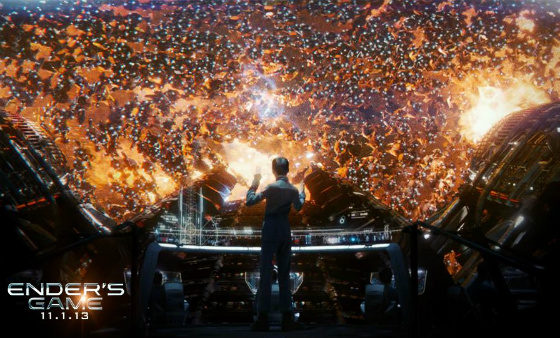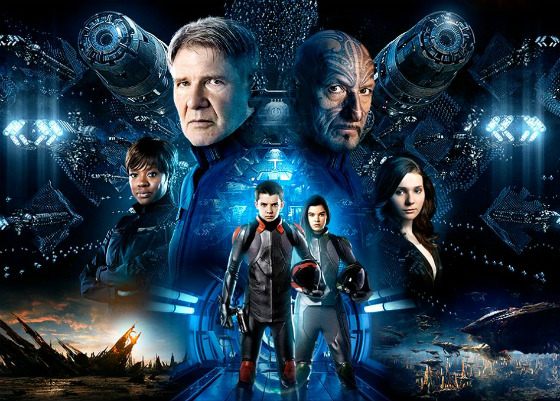TR Interview: Ender’s Game Director Gavin Hood
 |
From Tsotsi to X-Men Origins: Wolverine, South African director Gavin Hood has always had a thing for loners and rebels, and their moral dilemmas. It’s probably not too controversial to say the results have been mixed, but with Ender’s Game, he rises to his biggest challenge yet: a massively effects-heavy adaptation of a well-loved science fiction novel written by a well-hated author whose vocal prejudices threaten to derail any focus on the substance of the movie itself.
I’m still under embargo as far as offering a review – but I think it’s pretty safe to tell you that it’s better than X-Men Origins (a lot of things are). I didn’t have a whole lot of time with Gavin, but we got to talk a decent bit about how his military background informed his take on the story…and even obliquely touch on the issues with the author.
LYT: Hi Gavin! I was one of many who visited the set of the movie last spring, and it’s quite a trip to see it in its final form.
GH: It seems like a lifetime ago, right? It does for me, anyway.
 |
LYT: Right. I asked you a version of this question then, but I want to update it a little bit. Between Tsotsi and Wolverine and this, there’s sort of a recurring theme of characters who are really good at violence, but don’t want to be by the end of it. In what sense do you relate to that, and is that what drew you to Ender’s Game?
GH: You know, you’re probably tapping into stuff I should talk to my shrink about. [chuckles]And do talk to my shrink about. Yes, I was drafted when I was young, and it was a shock to feel that I was in a place where I was being encouraged to utilize the aspects of my personality that my mother would probably be horrified to see exploited; in particular, one’s capacity for aggression. And it was a shock to me, because in those environments, a certain amount of killing instinct is what they want. They’re not sending you there after all to learn to shine your shoes, which sometimes your mom thinks. They’re training you to be effective at the task of killing, and it was a very confusing and informative period of my life.
So I suppose all artists repeat themselves on the themes that most obsess them, whether they realize they’re doing it or not; it’s just the material that they’re drawn to. And I think what interests me is that I think that we as a species, and we as individuals, are capable of great compassion and tremendous kindness, but we are also capable as a species of terrible acts of violence and aggression, and we as individuals have to take responsibility for the way we behave and the choices that we make, in the way that many people don’t ever have to necessarily face that possibility. But when young people are drafted, as is happening, or go into the military even if they’re not drafted – we’re in this kind of endless state of war now and we’re asking young people to go and do things on our behalf, as a society. I’m not sure that we as adults sending them, or they as young people going in, have a full appreciation of the demands psychologically that are being placed, or will be placed, upon them.
 |
Ender’s Game for me is two things. On the one hand, I hope it’s a big, fun, exciting, sci-fi piece of entertainment. And on the other hand, I hope it’s a film that, if you want to, you can have a few discussions about, in terms of themes and ideas of preemptive war, the way that we use young people to fight our wars, the notion of what good leadership is, the idea of when should you question leadership, and ultimately, how do you take responsibility as an individual for your own destiny, and not blame authority, or your parents, or this figure of Colonel Graff, if you like, and make choices that you yourself are comfortable living with. And that’s – everybody will choose differently, but one has to make that choice for oneself, and not under the influence of recruiters or pressures of society.
Because recruiters will only tell you the good stuff, they will only tell you “You’ll be a hero! You’re going to go to college!” They’re not going to tell you you’re going to suffer from post-traumatic stress disorder, or you wouldn’t go, you know? So I don’t want to get too heavy about it, but since you asked what are the themes that seem to run through my work, I guess you’re right – that sense of having to take responsibility for your own actions, decisions, and the way you find your own moral compass is something that I guess interests me, yeah.
LYT: The first time, when I read the book, my immediate reaction – I’m not a veteran myself, but it felt like the whole thing was an allegory for PTSD of today’s troops. They go in thinking it’s going to be like Call of Duty and it’s like playing video games, and it’s like…
GH: You’re right! Just say that for me, and I’ll be so happy, because nobody’s said it that way. You’re right. Go in playing Call of Duty, and come out going, “What the fuck?”
LYT: Yeah.
GH: And that’s one of the other themes that really interests me, because you’ve mentioned it. It is interesting the way video games and real war are starting to blur. The line between reality and game is narrowing. Video games are becoming more and more realistic, and war is becoming less and less realistic, in the sense that it’s drone warfare and fought from a distance – we watch it on CNN, and it’s easy to be confused in both directions.
 |
On the one hand, you could easily be seduced into joining a military based on the notion that you’re playing Call of Duty. On the other hand, you could be desensitized to the reality of real war by thinking it’s really kind of a game, which it isn’t.
LYT: Yeah. There’s a lot that this book predicted. Video games obviously weren’t that realistic at the time, but Orson Scott Card also kind of predicted the political blogosphere, which you didn’t really have room for in this movie.
GH: No, I think you’re absolutely right. It’s a story that I think is great in the book, the Valentine-Peter blogosphere, Demosthenes- Locke storyline I think is fantastic. The difficulty I had was, you know, you’re trying to make a movie in two hours, and today, that story of being a blogger and then somehow becoming the ruler of the world feels a little unrealistic, because everybody blogs now, and you’re not going to seduce everybody into making you the leader of the free world through blogging, because there is so much blogging. And also, quite frankly, the difficulty of filming people and making it look cinematic that are sitting behind a computer writing on the Internet – it’s not the most cinematic part of the book. And that’s why I think there are things that books can do better than film, and there are things that films do better than books.
And so I thought, what aspects of the book can I really highlight in filmmaking terms and bring to life in ways that the book, perhaps, couldn’t – and that’s the battle room. The book brings it to life beautifully, but in the book, it’s a black box. I thought we could take this to another level in my medium. And similarly with the simulation battle at the end where they’re basically sitting at computer terminals, playing a game – what if we set it in this huge, sort of black space and create sort of the ultimate video game all around us? Maybe cinematically I can do something that might even make the fans of the book , of which I am one, go “Oh wow! That’s kind of cool what he did with that part of the book!” And hopefully that counterbalances the bits I had to leave out. I don’t know.
 |
LYT: At a recent book fair in L.A., Orson Scott Card said he didn’t want to see Speaker for the Dead ever get made. Are there restrictions on what the sequels are, and are you attached contractually to do any more after this one?
GH: At the moment the answer is no, I’m not attached. It was so hard to get this film made, and to raise the money, which we got from many distributors around the world, including obviously Summit here in America. We needed financing and no one studio would make this film on its own; they just felt it was too risky. So it was so hard to get the movie made that nobody was ready to sign any deals for a second one until – and we’re still in that place – unless this thing does well, there won’t be a second one.
So we’re all kind of nervously waiting to see what happens on November 1, quite frankly. And then there will have to be a conversation about – although obviously we’ve had certain conversations, like if we were to do a second one, how would we approach it, and there are multiple ways.
Speaker for the Dead, as you know, involves Ender 30 years older, which isn’t great if you’re trying to keep your fan base attached to the actors that you’ve already used in the first one. So the answer to your question is there are currently no definite plans to make a sequel. We have to see how we do on November 1st, and then we will have to see what kind of sequel we make, if we would like to keep some of our key cast in place – especially the young cast, I mean – Asa and Hailee and so on.
LYT: Has Orson seen it yet? I know he visited on the set and said it looked great, but do you have a reaction from him?
GH: Yes, he has, I believe, had a very positive response, but I haven’t seen it with him. So I’m told by his agents that he really liked the movie. But I think that’s something that you’d have to follow up with him. I don’t want to speak for him. I really don’t , you know what I mean…
LYT: I feel like they’re keeping him from the press at the moment, which may be the best idea.
GH: Yes. You said it, not me. [laughs]
LYT: I’m a fan of the book – I’m interested to see how it plays with people who don’t know it.
GH: Yes, thank you, I am too, because it’s got to work for both, and that’s what’s always hard with these books that have a strong fan base – and as I say, I’m a fan – so it’s tricky, because you have to make it work for both, and I hope we have. I think we have.
[all photos via the official Ender’s Game Facebook page]